What follows is the basic "A-C-T-I-V-E" model, created by Dr Ken McGill (2017).
I encourage you to view each of the links associated with the model, as the additional information provides supportive data that is relevant to each of the points in the model.
In the next post, I'll provide a clinical rationale for the "A-C-T-I-V-E" model (Choosing Change #10) which will be followed up with a list of Values to assist you in clarifying what Values are important to you as you apply the model to your life.
Finally, as the featured image suggests, know that you're planting seeds or behaviors that you'd like to eventually harvest and be edified by. It will take time to grow and develop the behaviors, but the outcomes are definitely worth it when you "reap what you sow!"
Thanks much!
Dr. Ken McGill
The "A-C-T-I-V-E” Model

Take a look at the picture of the field thats been freshly plowed. Do you remember the old saying "the land is teeming with energy?" Most of us would take a look at this fertile soil and think we could grow anything in it!
Well, this photo is actually a word picture (and definition) of our English word "Active." The Greek word for Active is "Energes," and you could probably see another English word embedded in the Greek word: Energy.
Dr. Spiros Zodhiates defines Energes as "active, powerful, effective and work." Merriam-Webster defines Active as "characterized by action rather than contemplation and speculation; producing or involving action or movement; marked by vigorous activity; requiring vigorous action or exertion; having practical operation or results."
This is exactly what we hope to experience as we make a commitment to apply the "A-C-T-I-V-E" model in our lives: To experience fruitful growth by "planting and nurturing" knowledge, experiences, treatments, processes, values, virtues and behaviors into our being in order to actively and consistently produce change, healing and growth for ourselves and others who are important to us.
As mentioned in the previous posts (Choosing Change: Schemas, Defenses, Distortions and Resolutions, Part 1 of 3 and Part 2 of 3), employing the "A-C-T-I-V-E" model helps us to remain active in our process of doing something constructive with our thoughts, feelings and behaviors especially when we notice the presence of these "unwanted weeds" (i.e., schemas, schema modes, defenses and distortions) popping up in our mental garden.
This integrated model also embraces the concept of Neuroplasticity with your Brain, as your mind (and soul and spirit) is the freshly plowed land that's teeming with energy thats capable of producing and growing new insights and behaviors, regardless of your past or recent life experiences.
So in closing this post, I encourage you to use this model to obtain additional information and strategies that our Healthy Adult mode could utilize as we endeavor to "extract 'function' from any 'dysfunctional' behavior" thats been sabotaging our effort to live a constructive, focused, enjoyable, mature and rewarding life.
What follows is a brief explanation of the model, which contains suggested goals, activities and skills associated with each of the six parts of the model, accompanied with a few process questions and some practical applications.
Final thoughts before introducing the "A-C-T-I-V-E" model:
Keep in mind this is "a model and not the only model" for changing and improving your behaviors. It goes without saying that the disciplines of Psychology and Theology along with Addiction and Trauma treatment models have contributed rich and excellent resources that I'm not ignoring nor replacing with the introduction of the "A-C-T-I-V-E" model.
This model may work for some of you, and for others, you may only receive a partial benefit as you apply the strategies in your life. Still, I encourage you to diligently work in each of the six areas of the "A-C-T-I-V-E" model in order to benefit from your labor, but I'll respect your decision to "take what you can use and leave the rest" if this works best for you.
Thankfully, I'm hearing and I've heard from others who have applied this integrated model into their life and its helped them to accomplish just what the model is created to accomplish: Becoming a healthy human being and a functional Adult. My hope is that you too will receive similarly positive results!
The "A-C-T-I-V-E" Model encourages you to...
A: Be AWARE of how schemas from your past experiences could be sabotaging your current efforts. We’ll want to be AWARE of how our old maladaptive schemas and thought patterns that were “uploaded and/or programmed” into us at a younger age are currently operating and sabotaging our efforts by triggering episodes of Emotional Regression and by activating maladaptive schema modes.
These internal processes threaten to sabotage our ability to come to our own assistance and to the assistance of our relationships. Once we’re aware of which Schemas and Schema modes are “triggering and firing,” we can…
C: CHALLENGE, CHANGE and replace the unwanted Schemas with adaptive and Healthy Adult mode behaviors that work! This means we’ll need to work hard to identify, change and convert negative personality traits into productive and positive traits that are life-giving and life-affirming to us and to others. As we do this, we’ll want to…
T: TERMINATE any destructive Ego Defenses or Cognitive Distortions that our maladaptive schemas want to use to “protect” us, but really keep us stuck in child-like ways of operating. Being aware of then challenging, changing and replacing distorted thinking and defensive reactions helps us to transition from being “reactors to actors.”
As Actors we’re consciously and responsibly involved in our own change, healing and growth processes. What really helps our process to gain momentum is to…
I: INVESTIGATE what Adult Values and Virtues make sense to us and are reasonable for us to develop and incorporate into our lives on a daily basis (especially to counterbalance our maladaptive schemas and maladaptive schema modes). Identifying values that help to protect, affirm, nurture and breathe life into us while also guiding us to develop loving, meaningful and mature relationships is what our Healthy Adult mode (and our Higher Power) is capable of giving to us.
Once these “very valuable values” are identified, we afford ourselves with the opportunity to reap and benefit from living a value-filled, value focused and empowered life! But investigating and identifying the values is only the first step. After this, we’ll want to…
V: VALIDATE ourselves by consistently living according to values, virtues and ideals that are sensible, reasonable and functional for us and others. On the surface this seems like an easy choice to make. However, when the “Tyranny of the Shoulds, Musts and Oughts” resurface, they try to hijack us from functional and intentional living because our schemas and schema modes tend to trigger emotional regression, which facilitate immature and child-like reactions.
Daily practice of our Values provides us with empowering reminders that we have choices, opportunities and abilities as Adults to make informed and responsible decisions to protect, love, nurture and guide us in our efforts to become Wise or “skilled at living.” Finally, what makes being “A-C-T-I-V-E” a success is being in a continual mindset to…
E: EVALUATE if our choices and behaviors are helping us to achieve the outcomes that we want and are working toward. The English word “Evaluation” comes from the French word “Evaluer,” which means “to find the value of.” What this means is that most of the choices that we make based on practicing our values will yield very productive outcomes for us.
However, when our choices cease to provide the optimum changes that are good for us and others, we evaluate then recalibrate to make any necessary changes to stimulate productive growth outcomes per our values for ourselves and others.
Living in the Healthy Adult mode means we enjoy the fruit of our labor by practicing, extracting and enjoying the benefits that come from choosing to live by our values!
Thats it folks! Thats the "A-C-T-I-V-E" model. Short, sweet and seemingly simple however, like the field thats freshly plowed, we have some work to do in this season and the next, in order to not only survive, but to thrive! Enjoy the fruit of your labor!
Here are some practical applications with the "A-C-T-I-V-E" model:
The "A-C-T-I-V-E" Model (Goals, Activities and Skills)
1) AWARE: Be AWARE of how schemas from your past experiences could be sabotaging your current efforts.
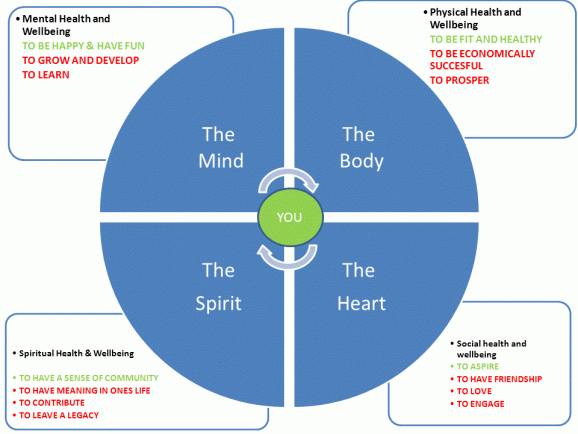
Goal (Aware): Increase our awareness skills in order to identify how negative , harmful and possibly traumatic processes and experiences from our past are currently interrupting our "biological - psychological - social - spiritual" (or "bio-psycho-social-spiritual") growth.
Activities (Aware):
a) Identify which of the 18 Maladaptive Schemas or Schema Modes are impacting your current thoughts and behavior (if you need to review their description, click here):
- Abandonment/Instability
- Approval Seeing/Recognition Seeking
- Defectiveness/Shame
- Dependence/Incompetence
- Emotional Deprivation
- Emotional Inhibition
- Enmeshment/Undeveloped Self
- Entitlement/Grandiosity
- Failure
- Insufficient Self-Control/Self-Discipline
- Mistrust/Abuse
- Negativity/Pessimism
- Punitiveness
- Self-Sacrifice
- Social Isolation/Alienation
- Subjugation
- Unrelenting Standards/Hypercriticalness
- Vulnerability to Harm or Illness
- "Fight" Schema Modes:
- Critical Parent
- Punitive Parent
- Angry/Enraged Child
- Impulsive/Undisciplined
- "Flight" Schema Modes:
- Detached Protector
- Spaced Out Protector
- Angry Protector
- Detached Self-Soother
- "Freeze" Schema Modes:
- Compliant Surrenderer
- "Poor Me" Victim
- Surrender to Damaged Child
- Overcompensator Schema Modes:
- Attention and Approval Seeking
- Self-Aggrandizer
- Suspicious
- Compulsive
- Perfectionistic
- Worrying
- Scolding
- Rationalizing
- Vulnerable Child Modes:
- Lonely Child
- Abandoned Child
- Humiliated/Inferior Child
- Dependent Child
b) How are your identified schemas and schema modes interrupting your ability to remain in your Adult mode? What do you think are your underlying but important needs that you attempting to satisfy "maladaptively?
c) Embrace any behavior and process that helps you to become mindful about your thinking, feelings and behaviors, especially with your schemas. I've encouraged others to look at these words that help to develop self-awareness processes, in addition to these Emotions and Feelings Charts and this information for growing our Emotional Self-Awareness. This self-help link provides rich and practical material on the subject of Mindfulness and how to grow in the practice of being Mindful.
d) Remember, since we think better when we feel Safe, I encourage you to engage in any process that helps you to bring calm to your body, mind and spirit. Visit this link to begin to identify how you could create safety for yourself, and/or listen to Shannon Rios' I am Safe, Loved and Nurtured guided meditation or other meditations that facilitate calm to assist you with your ability to create internal safety as you work to come to your own assistance.
Skills (Aware):
a) Developing mindfulness habits helps us to see whats going on psychologically and biologically within us and empowers us with the ability to interrupt any unwanted, unhealthy and potentially incapacitating schemas that foment error message(s) from our past. When we recognize then interrupt the internal error messages ignited by our maladaptive Schemas, Schema modes, Defenses and Distortions, we're actually doing Adult Ego state and Healthy Adult mode work.
b) Our Awareness provides us with the ability to analyze what got triggered, brainstorm, select then employ better options that are more adaptive that work for us and the situation at hand, then take responsibility to create better outcomes based on exercising behaviors that are in accord with the values we've chosen to live by.
2) CHALLENGE AND CHANGE: CHALLENGE, CHANGE and replace the unwanted Schemas with adaptive and Healthy Adult mode behaviors that work!
Goal (Challenge and Change): Challenge and convert the negative personality trait(s) associated with the schema into a productive trait that is life-giving and life-affirming to us and to others.
Activities (Challenge and Change):
a) Create a table where in Column A you'll record the maladaptive schema or schema mode thoughts that are triggered.
In Column B you'll log the Healthy Adult responses that are based on the values that you wish to practice to change your outcome.
Don't worry about being perfect or competent with "Column B" behavior at the offset of your work. Remember, you're in a season of your life where you'll want to identify the values and behavior that you wish to grow and as you continue to work at it, competency, maturity and productivity will emerge.
What follows are examples of Column A (Negative Schemas), followed by Column B (Constructive Values) for you to consider:
- Example 1:
- Column A (Schema is Failure): "Why bother, because she's going to divorce me."
- Column B (Value is Commitment): "If I work my program then I'll change how I feel about myself."
- Example 2:
- Column A (Schema is Mistrust): "After what you've done, I don't know if I could ever trust you again!"
- Column B (Value is Self-Care): "I need to take responsibility for my hurt, pain and healing."
- Example 3:
- Column A (Schema is Entitlement): "I'm really going to let him have it this time."
- Column B (Value is Gentleness): "Wait a minute; I don't operate that way anymore; thats not going to bering me closer to my goal."
b) Take a look at the Karpman "Drama" Triangle table below.
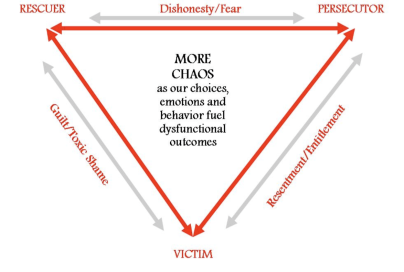
Identify how your schemas and schema modes cause you to engage in what I call "Red Triangle behavior," where your feelings, statements and behaviors are driven by your Adolescent (and Emotionally Regressed) "Little Professor," who uses the Victim, Persecutor and Rescuer stances in a misguided attempt to get your needs met:
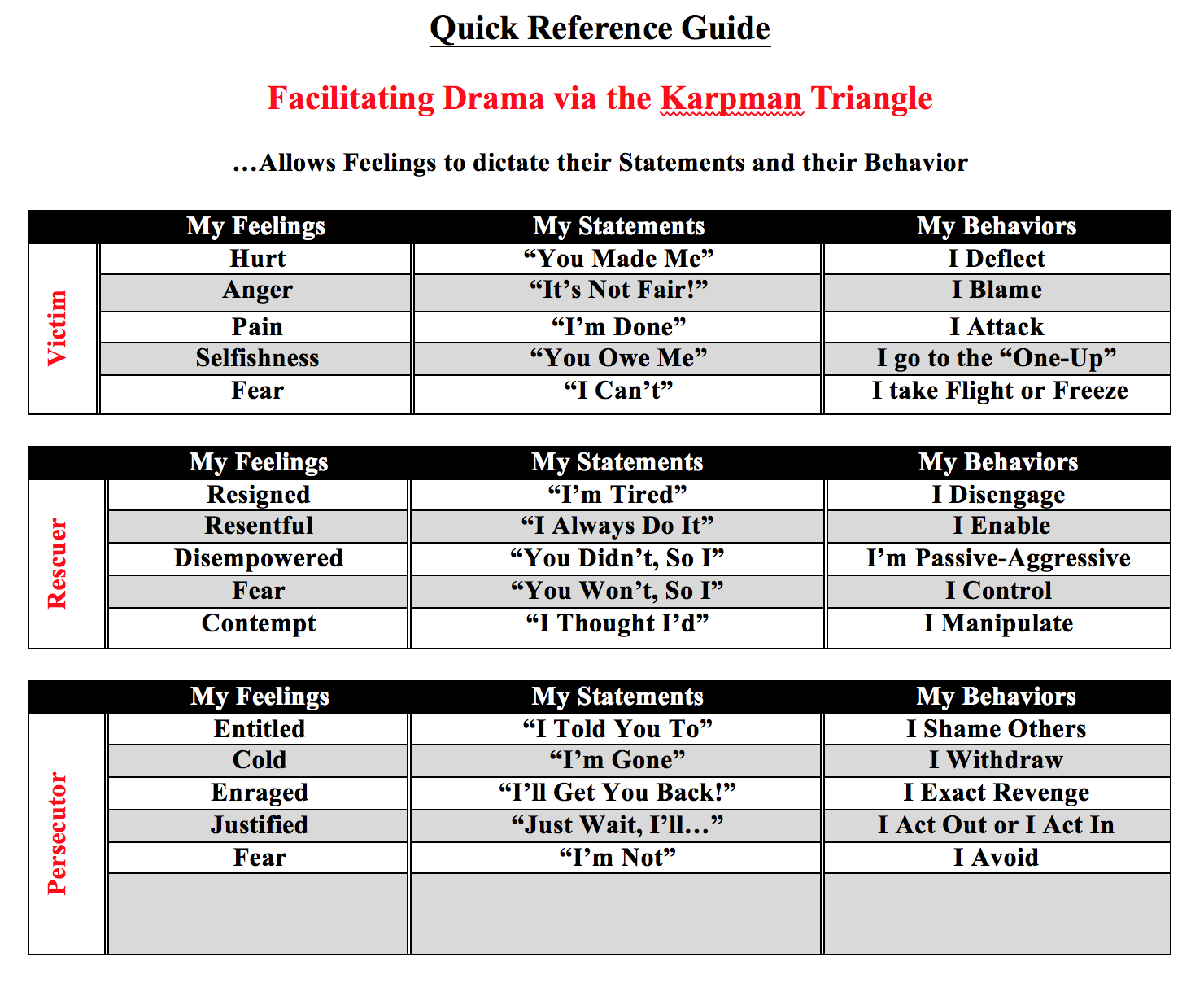 Now take a look at the Equality/Empowerment Triangle table below.
Now take a look at the Equality/Empowerment Triangle table below.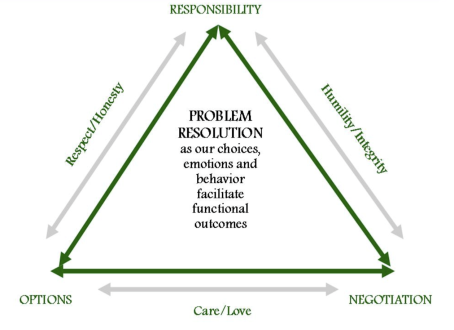
Identify how your Healthy Adult mode could help you to come to your own assistance by engaging in what I call "Green Triangle behavior," where your statements, behaviors and feelings are focused on achieving constructive, empowering and responsible outcomes for yourself and others involved.
These Healthy Adult outcomes are apt to occur when you take responsibility for your own actions, brainstorm (self or with others) what options either meet your needs or solve your problems, which means you'll use your power, energy and influence in a collaborative effort to negotiate "win-win" outcomes for yourself and the others involved.
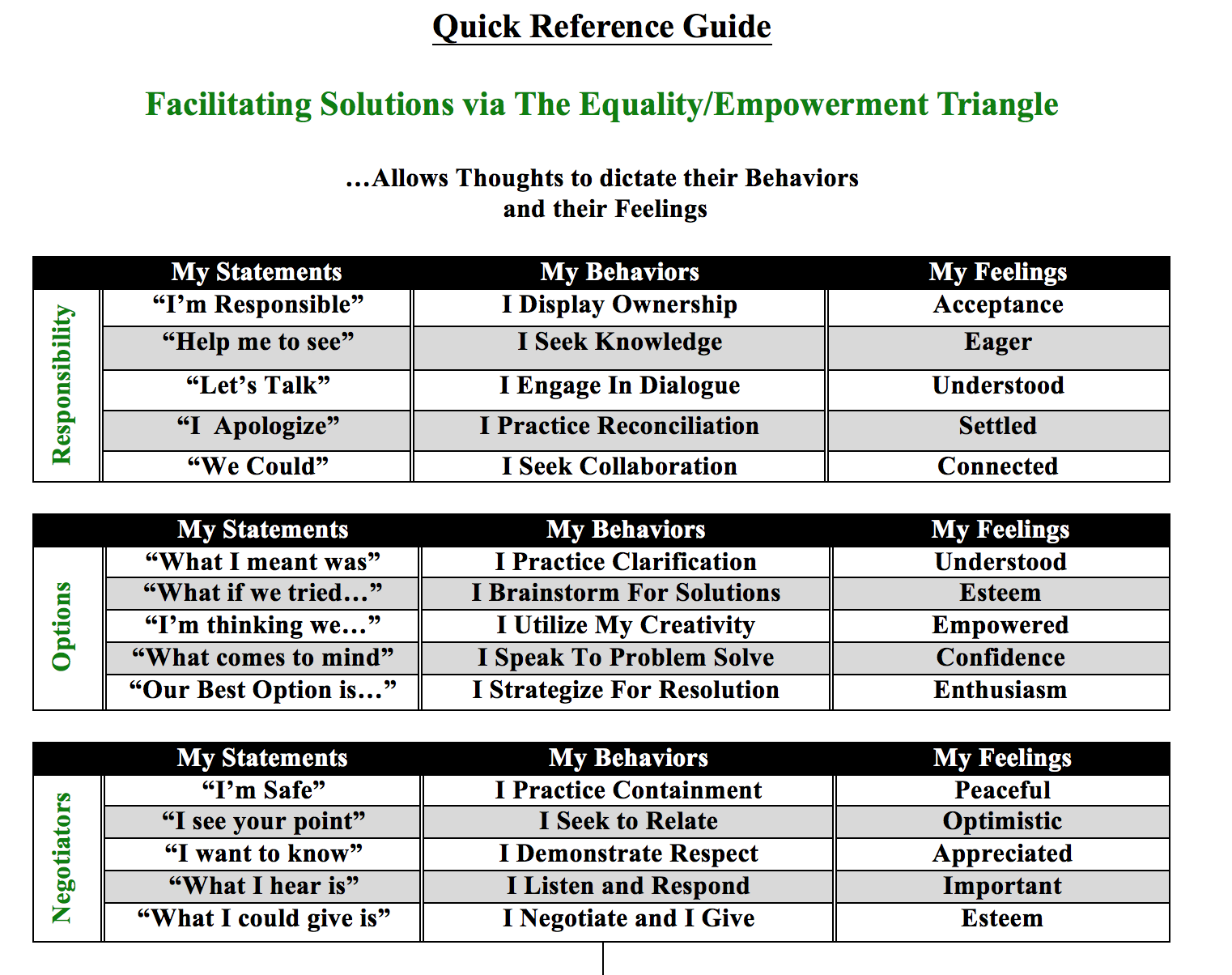
Which of these statements, behaviors and feelings do you resonate with? What from this table might your Healthy Adult (Ego state) use to try to get your needs met or work toward problem resolution?
Skills (Challenge and Change):
Challenging and Changing unwanted negative thoughts that most likely are triggered by our Schemas and Schema modes empowers us with the message that we're able to change our circumstances and predicament immediately!
What makes this work best is to know that your Adolescent Little Professor Ego State will draw upon faulty, half-baked and downright juvenile thoughts and behaviors to try to get his/her needs met or to solve problems. This is probably the worse use of your mental and emotional energy because the outcomes will always resemble something that is adolescent in "taste and flavor."
The best use of your energy is for your Healthy Adult to identify, implement, practice and benefit from the values and virtues that make sense to you that are respectful and humane, and help you to live your life genuinely, authentically and with the practice of unconditional positive regard to others (that is, if these values line up with yours!).
identify which values and virtues that you want to live by will you implement to help you and others.
Another Skill to develop is to learn how to "live your life in consultation." What this means is that one of the first things that could prove to be helpful with challenging then changing my cognitions is to practice the spiritual discipline called Fellowship. Fellowshipping helps us to "live in consultation" with other people who are wiser, have answers, could provide guidance and help us to "drop the rock" of self-abuse or to not abuse others by engaging in Red Triangle thinking or behavior(s).
On the contrary, these "Yodas" (i.e., Pastors, Priests, Therapists, Sponsors, Coaches, Spiritual Guides or Healthy Adult role models) that we're encouraged to fellowship with will also "re-mind" us to use our energy constructively by considering truthful, corrective and affirming behaviors that we could employ to obtain positive outcomes with our thinking. These "as iron sharpens iron, so one person sharpens another" encounters model how we're able to come to our own assistance quickly and regularly for our own well being.
3) TERMINATE Defenses and Distortions: Terminate any destructive Ego Defenses or Cognitive Distortions that our maladaptive schemas want to use to “protect” us, but really keep us stuck in child-like ways of operating.
"One of the keys in any healthy relationship is a willingness to say 'I'm more interested in understanding what you're saying than in thinking of what I'm going to say once you're done talking.'" From It Takes Two to Tango by Gary and Norma Smalley.
Goal (Terminate): To cease and eliminate the harmful practice of using Ego Defenses and Cognitive Distortions in intrapersonally (within ourself) and interpersonally (with others in our lives).
To accomplish this goal, we'll need to identify which Ego Defenses we use or "default to" that sabotage our ability to operate as healthy and functional Adults (if you need to review their description, click here):
- Acting Out
- Attacking
- Avoidance
- Denial
- Displacement
- Dissociation
- Emotionality
- Fixation
- Fantasy
- Help-Rejection Complaining
- Intellectualization
- Passive-Aggression
- Projection
- Provocation
- Rationalization
- Reaction Formation
- Regression
- Resistance
- Somatization
- Undoing
- Always Being right
- Blaming
- Catastrophizing
- Controll Fallacies
- Emotional Reasoning
- Fallacy of Change
- Fallacy of Fairness
- Filtering
- Global Labeling
- Heaven's Reward Fallacy
- Jumping to Conclusions
- Personalization
- Polarized Thinking
- The "Shoulds, Musts and Oughts"
Activities (Terminate):
This is the last self-exploration step in the "A-C-T-I-V-E" model that focuses on unearthing parts of our "negative past." We use defense mechanisms typically because we feel anxiety or threatened, and we're more likely to employ cognitive distortions if we're depressed or anxious.
a) So if you've not done so up to this point, I'd like to encourage your to check in with a Psychiatrist, Medical Doctor, Psychologist or Psychotherapist for an evaluation to determine if you're struggling with clinical depression, anxiety or if there is a medical problem that could be the genesis of any problematic thinking and behavior.
These skilled individuals are able to assess if there are "biological - psychological - social - spiritual" factors that could be impacting your thinking and your mood, and they're able to suggest a treatment regimen that could improve your health in all of these important areas of your life.
b) The activities that you practiced earlier to gain Awareness and to Challenge and Change your Schemas will be useful here, as those same skills are necessary to identify when Ego Defenses and Cognitive Distortions are "bubbling up" in your mind and are threatening to derail you from operating in your Healthy Adult mode.
Applying the "Column A" (Identifying Defenses and Distortions) and "Column B" (Values to Live by) will be useful in your endeavor to terminate negative processes as you replace them with positive and constructive process that are helpful.
So as we did in the "Activities" portion of Challenge and Change with our Maladaptive Schemas, lets apply the same Column A/Column B exercise with our Ego Defenses and Cognitive Distortions:
Create a table where in Column A you'll record the Ego Defenses and Cognitive Distortions thoughts that are triggered.
In Column B you'll log the Healthy Adult responses that are based on the values that you wish to practice to change your outcome:
What follows are examples of Column A (Defenses/Distortions), followed by Column B (Constructive Values) for you to consider:
- Example 1:
- Column A (Defense is Acting Out): "I can't handle this anymore...I need a drink."
- Column B (Value is Recovery Skills): "I need to call Bill. He told me to get in touch with him when I felt like this."
- Example 2:
- Column A (Defense is Emotional Regression): "Who does he think he is? Calling me a con artist? I feel like punching him in the face."
- Column B (Value is Responsibility): "I'm peeved but I know that behavior isn't going to solve anything. Why would he say something like that? Besides I do need to exert more responsibility with my words and actions."
- Example 3:
- Column A (Distortion is Fallacy of Change): "Even if he doesn't want to hear this, he's going to hear it from me because maybe that'll make him treat me differently."
- Column B (Value is Gentleness): "Wait a minute; I don't operate that way anymore; that's not how I want to solve this; he really doesn't deserve my venom...he needs a kind and thoughtful word here. Thats better."
- Example 4:
- Column A: (Distortion is Jumping to Conclusions): "Hmm, a hug and a kiss. Whats he up to? Here comes the ask for sex, which is all he ever wants from me."
- Column B: (Value is Openness and Love: "I'm thankful that he is trying to be warm, tender and compassionate. I could really use more of this!"
As implied in the "A-C-T-I-V-E" model, you'll want to remain "active" in your self-discovery to determine when defenses and distortions occur, and you'll want to "act" immediately to challenge and terminate unhelpful thinking and behavioral processes in order to eliminate occurrences of "reactive" behavior, which serves no useful purpose.
Equally, replacing the negative thoughts with alternative, constructive and positive thoughts about your situation thats more in line with the values you elect to live by is just as helpful.
Skills (Terminate):
We terminate destructive Ego Defenses and Cognitive Distortions that negatively impact us by employing Choice, Decision and Commitment, which are three important Values to develop and live by.
Employing Choice is empowering because it reminds us that we have the ability to "think outside the box" about the Options that are available to us to create and remedy the issues which with we're faced.
Employing Decision means we've taken responsibility to make a choice, own our choice, then engage in self-guided behaviors (infused by living in consultation with others) to develop and grow "desired outcomes." This very act of being intentional with our decision means we won't be giving our energy to develop "unwanted mental and behavioral outcomes."
Employing Commitment is helpful because it means Trust will be established and built, as commitment infers we operate in and deliver consistent, reliable, dependable and predictable thinking, behavioral and growth processes for our benefit and for the benefit of others. Employing this form of commitment ensures we'll become trustworthy people who could be counted on because we practice values that facilitate trust.
Employing Choice, Decision and Commitment are skills that our Healthy Adult develops and uses to help us to grow beyond our "child-like" ways of operating and into the maturer person who develops, delivers and lives by values that are fruitful and edifying.
As we learned in the previous post with (Part 2 of 3), today, we get to terminate Defenses and Distortions and replace them with Efficacy, Empowerment and any other of the "Empowering E's" that are useful to us, because they help us to create saner outcomes and experience saner living!
Equally, we also learned that no matter what our Maladaptive Schemas, Schema Modes, Ego Defenses or Cognitive Distortions are, if we choose to change and work hard to change, then change is possible, because of our effort to "garden with intentionality."
4) INVESTIGATE (embrace and practice) Adult Values and Virtues: Investigate what Adult Values and Virtues make sense to us and are reasonable for us to develop and incorporate into our lives on a daily basis (especially to counterbalance our maladaptive schemas and maladaptive schema modes).
Goal (Investigate):
To identify personal values that help to protect, affirm, nurture and breathe life into us while also guiding us to develop loving, meaningful and mature relationships with others.
Activities (Investigate):
a) Create a list of Positive Affirmations about yourself (take a look at this link for an example). The purpose of this activity is to obtain a clearer idea of who are you and whats already of "great value" inside of you. By creating a list of positive affirmations about yourself you'll identify what has been, is, and what could be very important to you in your future, especially as you consider your personal wants and needs.
b) Now create a list of practical behaviors based on the Values and Virtues that are important to you that you'd like to grow and develop in the "7 Core Areas" garden of your life.
To do this exercise, take a look at what the 7 Core Areas Chart (which encapsulates who we are Biologically - Psychologically - Socially - Spiritually).
I've often described these Core Areas of who we are as "rows" in the Garden of our life that we'll want to plant very intentional values, virtues and behaviors that are important to us, and that we'll harvest and be edified by. Based on the definitions of each of the 7 areas, which "Valuable Values" do you wish to plant, grow, nurture, develop, harvest, consume, be strengthened and edified by in your life, marriage, family and to have your legacy identified by?
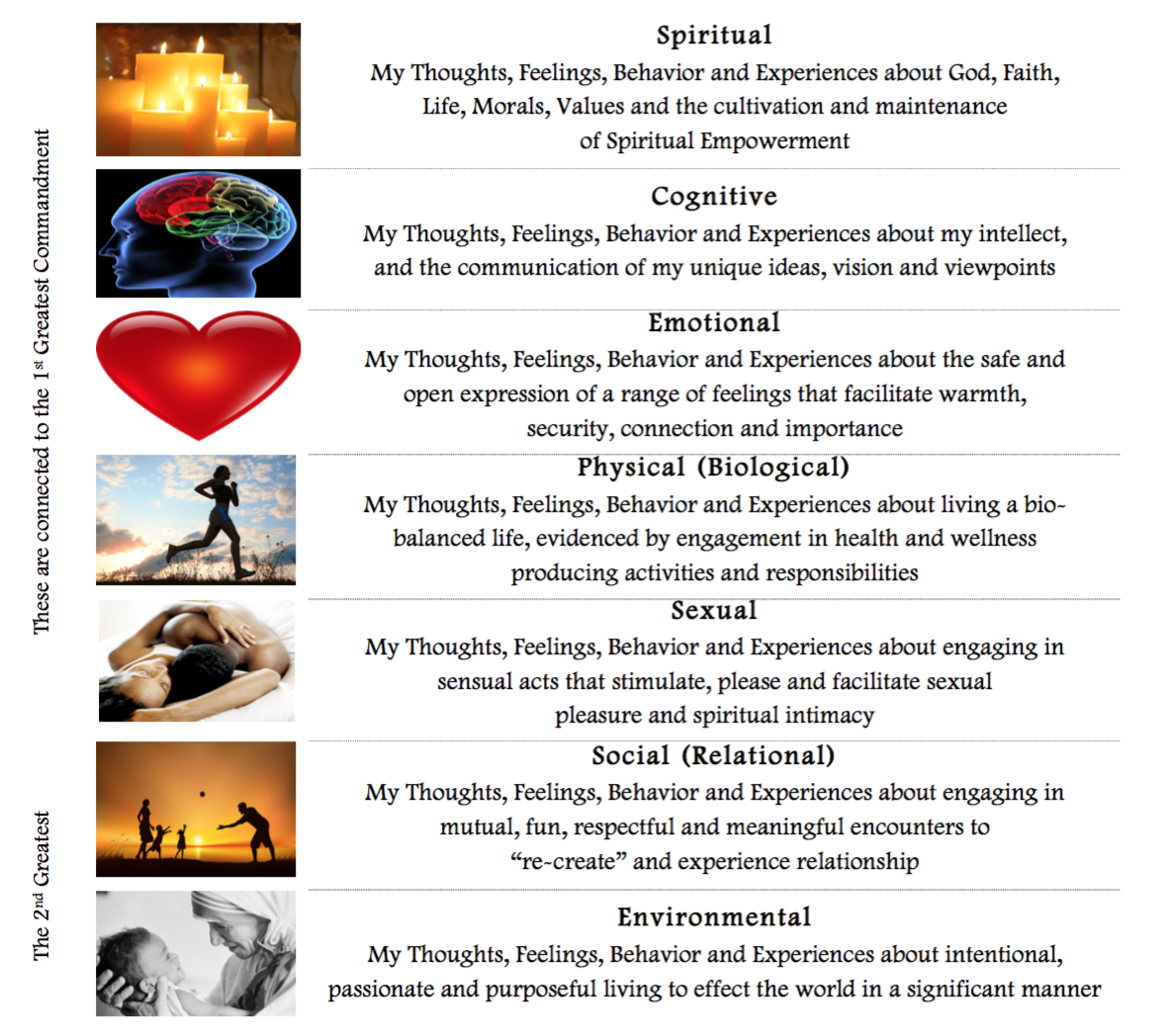
Here's a brief example of the Values (in parentheses) and the practical behaviors that I'm currently growing, developing and harvesting in the "rows" of my 7 Core Area garden:
- Spiritual (Personal Enlightenment): "I'm going to accomplish this by reading inspirational literature and writings on a daily basis so I'm able to see then practice how I can become a better person."
- Cognitive (Mindfulness and Empathy): "I'm going to think carefully about what I'm going to say, knowing my words impact positively or negatively. Equally, I'm going to ask open-ended questions to gain more knowledge of your needs."
- Emotional (Validation and Expression): "I'm going to validate your feelings, your experience and your reality, and not attempt to change it, because its yours. Equally, I'm going to engage in emotional self-awareness so that I'll be able to communicate my feelings to you in "real time."
- Physical/Biological (Decision and Commitment): "I'm going cut back on unhealthy foods that I eat in addition to add healthier selections to my diet. I'm glad that we've joined the new gym and I'm going to remain committed to exercising 4 times a week."
- Sexual (Romance and Care): "I'm going to make a conscious decision to 'make love to you outside of the bedroom' by dating you and delivering your love language to you so that will increase our interest and energy as we consider what goes on in our bedroom."
- Social/Relational (Conflict Resolution): "I'm going to use my communication tools to work through and resolve our conflict within 12-24 hours, so that I (and maybe we) eliminate the 'sweeping things under the rug' avoidance tactic."
- Environmental (Altruism): "I'm going to be open regarding how I could help pole by giving back, through my church, civic, fellowship or community organizations and in the process, feel good about myself and how others will feel as a result of my choices."
So what values have you identified that you'll focus on and intentionally plant in the 7 rows of your life garden? What values will you develop and deliver?
c) Make a list of the Character Defects (in italics) that have surfaced due to the presence of maladaptive schemas, schema modes, ego defenses and cognitive distortions. Then identify the "Character Values" (underlined) that you've chosen to live by that will replace your defects, along with what you hope to grow in your garden. Here's my list (Character Defect → Character Value):
- Abusing others for my enjoyment → Safety: Becoming a safe person and creating safe experiences and environments for others in my presence.
- Being Argumentative → Communication: Learning processes that help me to resolve conflict.
- Beating myself (or others) up → Ministering to Self and Others: Prime components of Healing, which are rooted in trying to be therapeutic to myself and others.
- Avoiding communication → Assertive: Taking the first step to address or resolve my current problems.
- Being Fearful → Love: The practice of the adult characteristic of love guides me to move beyond my child-like fear based reactions toward functional, practical and mature expressions of the characteristic.
- Being traumatic to others → Energy: I want to use my energy to cultivate healthy and healing behaviors and encounters with others.
- Playing God with self → Humility: This helps me to live in the healthy middle ground of Humanity.
- Being undisciplined → Discipline: Developing and practicing self-care rituals that promote growth.
- Measuring myself against others → Acceptance: Developing serenity regarding what I cannot change and the courage to change that which I can change.
- Valuing the opinion of a sick mind (my own!) → Spirituality: Valuing my opinions because some of my rituals focus on helping me to hear from my God.
c) Take a look at this list of Character Values as found in the "Values in Action Inventory of Strengths" produced by Dr. Christopher Peterson and Dr. Martin Seligman.
- Wisdom and Knowledge: Creativity, Curiosity, Judgment, Love of Learning, Perspective.
- Courage: Bravery, Perseverance, Honesty, Zest
- Humanity: Love, Kindness, Social Intelligence
- Justice: Teamwork, Fairness, Leadership
- Temperance: Forgiveness, Humility, Prudence, Self-Regulation
- Transcendence: Appreciation of Beauty, Excellence, Gratitude, Hope, Humor and Spirituality
Which of these would you want or need to develop in your life in order to achieve positive outcomes for yourself and others? Which of these Values, if implemented, would facilitate a pivotal and life changing moment for you and others close to you? Could you see yourself operationalizing them to eliminate then live beyond "Death Star thinking?"
Skills (Investigate):
Identifying our values helps us to identify what our wants, needs and even our what our purpose is in life. Once we're able to identify what our values are, our Healthy Adult mode helps us to communicate them clearly with others, but most importantly to put our values into action, whereby we're able to benefit from our work.
Regarding purpose, our Values also serve as a "GPS" (Global Positioning System) that guides us to demonstrate behaviors that are meaningful, purposeful, empathetic, affirming, nurturing, honoring and loving toward ourselves and others (again, if these are your chosen values).
My hope is that you'll take some time to answer the all important question posed by philosopher Francis Schaeffer"How shall I live?"
5) VALIDATE ourselves by living according to our Values: VALIDATE ourselves by consistently living according to values, virtues and ideals that are sensible, reasonable and functional for us and others.
Goal (Validate):
To live by a new and functional "Bill of Writes" (based on the Bill of Rights), where the "Constitution" that you have written affords you with inalienable rights to continually engage in behaviors that nurture, protect and inspire yourself.
Activities (Validate): Creating Your Personal and Relational "Bill of Writes"
Now its time to pull all of your work together to create a positive, constructive, realistic, workable and living document that will serve as the new "Constitution" that you'll live by.
Think about your needs that were either not met or undeveloped from your family of origin or your past. Going forward, as a healthy, functional and responsible Adult, think about how you will replace then replenish these valuable needs on a consistent basis.
Think about how your Healthy Adult "intervenes, comforts and consults" with the Vulnerable Child part of you in order to "protect, provide and pilgrim" with you for your benefit. Going forward, what significant role will that part of yourself serve in the Constitution you'll live by?
Think about what "Middle Column" living looks like on a daily basis and the "A-B-C" skills that your Healthy Adult Mode will draw upon continuously. Going forward, what and how do you wish to edify yourself and others as you demonstrate adherence to these life-giving principles?
Finally, think about what you wish to Challenge and Change, in addition to the important Values, Virtues, ethics, mores and principles that make sense to you, that you'd like to produce in the Garden of your life, relationship, marriage or family. Going forward, will you exercise Choice, make Decisions and remain Committed to growing these behaviors consistently?
Thanks for your Reflection and Contemplation. Keep these two Values handy and close by, as they could prove to be very helpful to you on a daily basis. But for now, its time to create your "Bill of Writes." What follows is a sample "Personal and Relational Bill of Writes" that a person created. Yours will have your unique fingerprints on it, but it will be no less valuable than the one created by the author of this one.
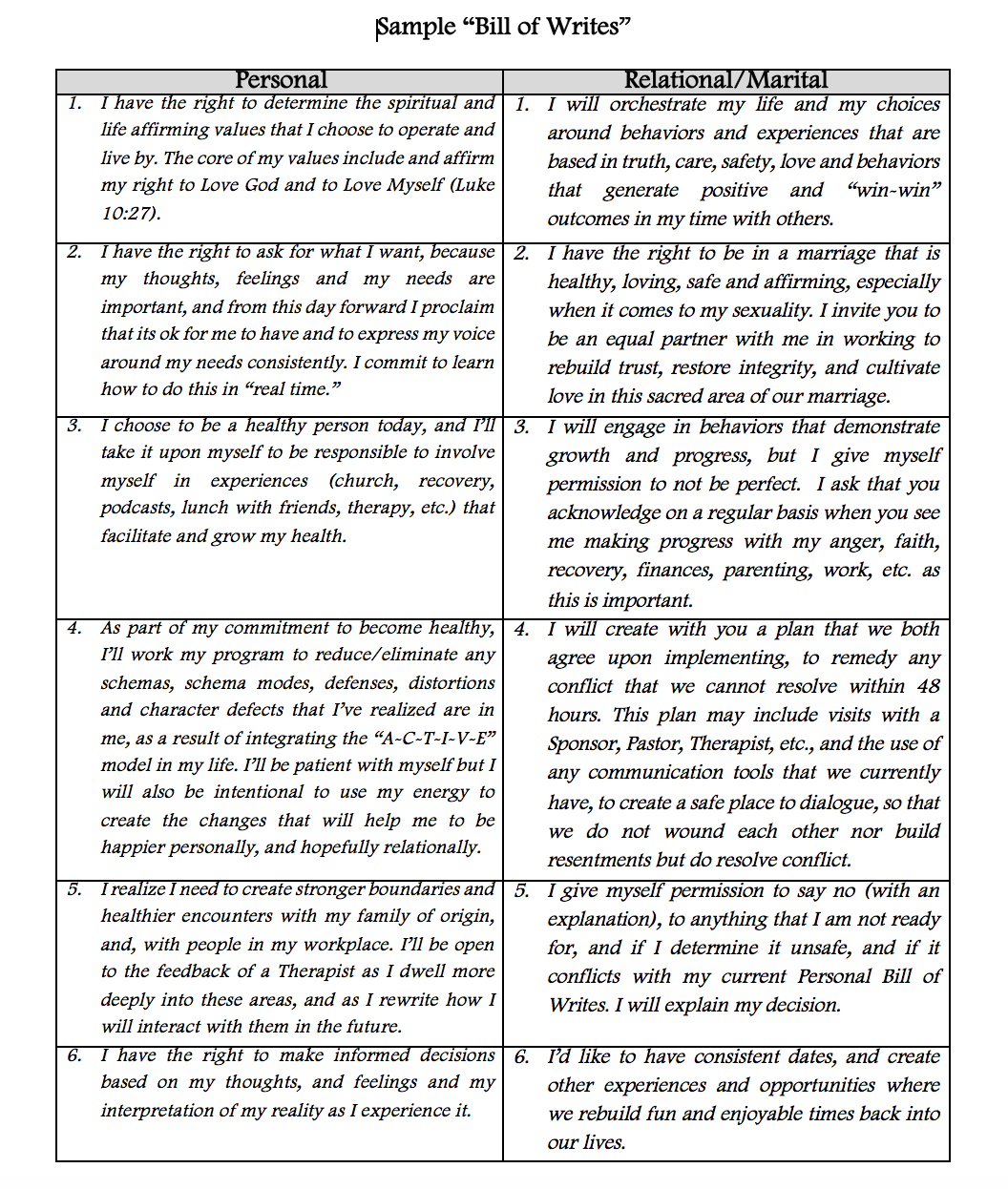 Skills (Validate):
Skills (Validate):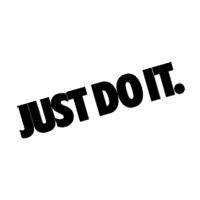
Living daily by our Bill of Writes provides us with empowering reminders that we have choices, opportunities and abilities as Adults to make informed and responsible decisions to protect, love, nurture and guide us in our efforts to become Wise or “skilled at living.”
Now, you're encouraged to be “A-C-T-I-V-E” with this model and in the words of this inspirational slogan that we've received from this 20th century...just do it. By the way, did you know that "NIKE" is actually a classical Greek word that means "Victory?" I encourage you to relish in the elation that accompanies being victorious when you practice and continually get better at living our the "A-C-T-I-V-E" model via your newly created "Bill of Writes!"
One more thing as we close this very long post...what makes this whole model and process a success is being in a continual mindset to…
6) EVALUATE your choices and behaviors: EVALUATE if our choices and behaviors are helping us to achieve the outcomes that we want and are working toward.
Goal (Evaluate):
To determine if you are reaching the goals, skills and changes as outlined in the "A-C-T-I-V-E" model.
Activities (Evaluate):
a) I encourage you to employ the "S-M-A-R-T" Goal approach to evaluating your progress by working the following questions into your process:
- Specific: What do I want to accomplish?
- Measurable: What tangible evidence supports that I'm hitting my targets?
- Appropriate: What characteristic( s) do I need to develop to be successful in this "micro-season" (defined as 3 - 4 months)?
- Realistic: What people, behaviors or experiences do I incorporate in this process to be successful?
- Time-Focused: Whats the time frame I'm setting for myself to cultivate this characteristic or aspect of my life?
b) At the end of the day, engage in a "spot check inventory" where you evaluate your behaviors by responding to the following questions:
- What am I most proud of today?
- What is one thing that I regret about today?
- What will I seek to improve upon or correct tomorrow?
- Which two values will I seek to implement and develop tomorrow?
Skills (Evaluation):
Remember, the English word “Evaluation” comes from the French word “Evaluer,” which means “to find the value of.” Employing the "S-M-A-R-T" goals approach in addition to taking a brief personal inventory at the end of the day will determine if you're making progress with your stated change processes.
Reflection and Contemplation coupled along with Intentionality will go a long way toward helping you to achieve the behavioral outcomes that are important to you.
Whats also important is at times you'll need (or want) to recalibrate" your choices and decisions within the "A-C-T-I-V-E" model in order to "course correct" your behavior immediately. quickly obtain the outcomes you want to make any necessary changes to stimulate productive growth outcomes per our values for ourselves and others.
Finally, by operationalizing the steps of the "A-C-T-I-V-E" model, we're encouraged to enjoy the fruit of our labor thats connected to being responsible, creative and diligent in our work of living according to our values!
Future posts on Choosing Change will be labeled “Choosing Change #10,” “Choosing Change #11,” “Choosing Change #12” and so on.
Also, as time permits, please visit the other blogs written by Dr Ken McGill: Daily Bread for Life and “3 – 2 – 5 – 4 – 24″ for additional information that could be helpful. I welcome your comments below or via email and your favorites, your retweets and your “+1’s” if you have a brief moment and find the information helpful. Again, it is my desire to provide the very best info for your consideration.

No comments:
Post a Comment